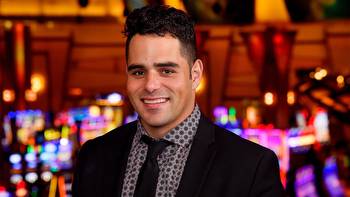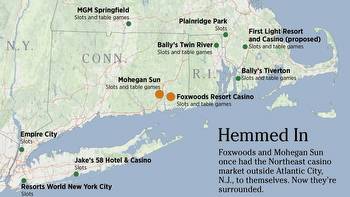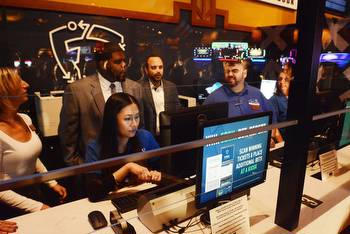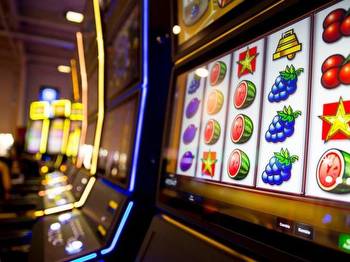Casinos’ slots revenue holding (almost) steady since advent of online gaming
With Connecticut’s introduction of online gaming approaching the two-year mark, industry analysts are considering the new form of gambling’s effect on traffic at Foxwoods Resort Casino and Mohegan Sun.
Are gamblers hunkering down at home or elsewhere, content to wager on their computers and hand-held devices? Or, as gaming-expansion proponents predicted, has the availability of online gaming (and sports betting) been a significant boon to business at the brick-and-mortar gambling palaces?
In the dynamic world of casinos, the answers aren’t entirely clear.
Some numbers-crunching by Spectrum Gaming Group, a Pennsylvania-based consulting firm that monitors legalized gambling worldwide, found slots revenue at the Connecticut casinos dipped slightly in the 12 months that ended in June, with the two casinos’ slots “win” ― the wagers they kept after paying out prizes ― falling to $848 million, down from $861 million the previous 12 months, a decline of 1.5%.
At the same time, online gaming operated by the casinos’ respective owners, the Mashantucket Pequot and Mohegan tribes, generated $279 million in gross gaming revenue in the 12 months that ended in June, a 95% increase over the previous year’s $143 million.
The small decline in the Connecticut casinos’ slots revenue is “not calamitous,” Matthew Roob, Spectrum’s senior vice president of financial analysis, said in a phone interview. But Spectrum noted that over the same period, casinos in Atlantic City, N.J., experienced increases in both slots revenue and online gaming revenue.
Two factors contributed to the Connecticut casinos’ decline in slots revenue, Spectrum concluded. The first was Connecticut’s simultaneous launch of online sports betting and online casino gaming in October 2021.
“Because sports betting is predominantly a digital activity, players immediately become more comfortable with also playing other games in a digital format,” Spectrum theorized.
New Jersey casinos introduced online gaming in 2013 and sports betting in 2018.
The second factor cited in Spectrum’s analysis was the decision by both Foxwoods and Mohegan Sun to continue smoking bans they had imposed upon reopening in the wake of the COVID-19 pandemic, a policy that might have encouraged casino gamblers who smoke to turn to online gaming.
Legislative attempts to ban smoking in New Jersey casinos have so far failed.
Jeff Hamilton, Mohegan Sun’s president and general manager, said he’s been pleased with the performance of both Mohegan Sun’s on-site and online gambling since the expansion of gaming in the state. He said comparing New Jersey’s “very mature” online gambling market to the Connecticut casinos’ immature market is not a useful comparison. He said New Jersey’s 2013 introduction of online gaming initially led to some decline in that state’s brick-and-mortar casinos’ slots revenue, after which it picked up.
“Coming out of the COVID environment, a lot of people were not traveling (to casinos),” Hamilton said. “Now, people are wanting to travel and they’re spending their entertainment dollar on things they haven’t been able to do.”
Mohegan Sun’s nongaming revenue is up significantly, he said.
At Foxwoods, Jason Guyot, the president and chief executive officer, said online gaming has been an “extremely positive” addition to the casino’s offerings, though due to fallout from COVID’s impact and growing competition in the region, it’s been hard to assess its impact.
A lot of older customers do not visit the casino as frequently as they did before COVID, while Massachusetts casinos have stabilized and gotten more aggressive in their marketing, Guyot said. In Rhode Island, Bally’s Twin River Lincoln resort casino opened a $100 million expansion this spring.
While the conventional wisdom in the casino business used to be that banning smoking harms business, that’s not necessarily the case any longer. Neither Hamilton nor Guyot believe there’s a correlation between the indoor smoking bans at Mohegan Sun and Foxwoods and the declines, however slight, in their slot revenues.
Hamilton said patrons are enjoying the “healthier environment” at Mohegan Sun, which he noted still operates a cigar lounge. “From the employees’ perspective, it’s healthier, too,” he said.
With smoking still allowed in designated areas of casinos in New Jersey and Rhode Island, it’s hard to tell whether the Connecticut casinos’ indoor bans put them at a competitive advantage or a competitive disadvantage, Guyot said.
“Nonsmokers are definitely enjoying it,” he said of Foxwoods’ smoke-free setting.


































